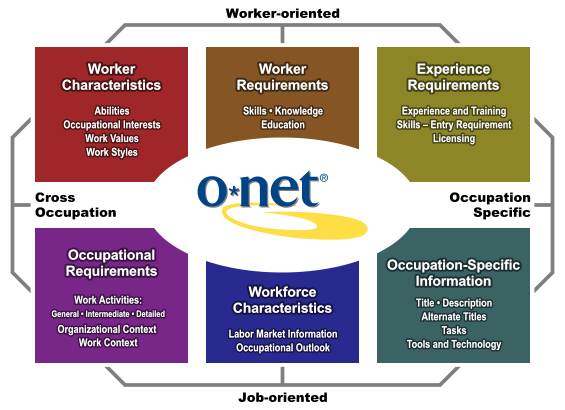The O*NET system is maintained by a regularly updated database of occupational characteristics and worker requirements information across the U.S. economy. It describes occupations in terms of the knowledge, skills, and abilities required as well as how the work is performed in terms of tasks, work activities, and other descriptors.
O*NET database Content Model

Every occupation requires a different mix of knowledge, skills, and abilities, and is performed using a variety of activities and tasks. These distinguishing characteristics, or "descriptors", of an occupation are collected, codified, and described by the O*NET Content Model . This hierarchical model starts with six domains (or categories), describing the day-to-day aspects of the job and the qualifications and interests of the typical worker. The model includes nearly 277 descriptors collected by the O*NET program, along with other occupational data collected by other federal agencies such as the Bureau of Labor Statistics .
Data Collection Real-world information
The Data Collection program brings the Content Model frameworks to life with results from the working public.
The O*NET database is collected and updated through ongoing surveys of workers in each occupation supplemented in some cases by occupation experts. These data are incorporated into new versions of the database on an annual schedule , to provide up-to-date information on occupations.. The latest database releases are available from the O*NET Resource Center.
O*NET Information Dissemination Online
My Next Move - Get started on a new career
My Next Move helps new job seekers, students, and other career explorers investigate over 900 occupations. The interactive web-based tool contains easy ways to search careers. The O*NET Interest Profiler is an online test which matches the user's interests and level of work experience to matching careers.
Easy to read occupational reports include the most critical on-the-job tasks and skills. Job seekers can also find local salary information, training opportunities, and even job postings.
Specialized versions of My Next Move include:
- My Next Move for Veterans which provides targeted services to Veterans, and
- Mi Próximo Paso for Spanish-speaking career explorers/job seekers.
O*NET OnLine - Explore detailed O*NET data from your browser
O*NET OnLine is a comprehensive web application for exploring the O*NET database. Occupation reports offer a range of information, from a broad overview to comprehensive detail on a specific subject.
Career Exploration Tools - Professional assessment instruments
Using the O*NET Career Exploration Tools , students and workers may explore a range of career directions, based on their interests, work values, and abilities.
The computerized assessments and related materials are available as free downloads. In addition, workforce development professionals may be interested in the paper and pencil versions. Print shop files for these tools can be downloaded and taken to a professional for printing.
Code Connector - O*NET classification made easy
Designed specifically for professionals who need to be able to match the job title of an individual to broader occupational information, O*NET Code Connector makes it easy to match a job title to occupations in the O*NET system.
For more information about O*NET, visit the Frequently Asked Questions.
Who uses O*NET?
O*NET information is relevant to many different audiences. Below are possible user groups and how they can engage the system:
- Counselors: Connect people to appropriate occupations with resources like the Career Exploration Tools and O*NET OnLine . For self-directed career exploration, My Next Move is a great starting point. If you need to find an O*NET profile for an existing job, try the keyword search at O*NET Code Connector .
- Students: Discover occupations you might enjoy, by taking the Interest Profiler assessment located at My Next Move . If you've already got an occupation in mind, learn more about it from the occupational profiles, including necessary skills, education, and certification...
- Business: The O*NET Toolkit for Business contains examples and case studies illustrating how O*NET information can help you with writing job descriptions or human resource planning. Learn more about occupations using O*NET OnLine .
- Researchers: The Research and Technical Reports section contains over 30 papers on the development and evolution of the O*NET database and tools and scores of other papers on specific O*NET topics. For detailed study, download the database itself to directly view the data, as well as statistical metadata describing the quality of the information.
- Developers: Everything you need to incorporate O*NET information into your application can be found in the O*NET Resource Center , including URLs for linking directly to O*NET OnLine and code for O*NET web services. The Supplemental Files page has resources for connecting other systems to the O*NET-SOC taxonomy, as well as downloadable datasets such as Detailed Work Activities, Tools & Technology, and Spanish translations of the datasets.
